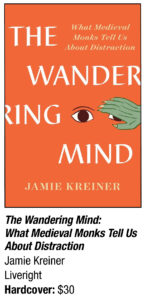 The digital era is beset by distraction. At times like these, the distant past beckons as a golden age of attention. People dream of recapturing the quiet of a world with less noise and imagine retreating into solitude and singlemindedness, almost like latter-day monks.
The digital era is beset by distraction. At times like these, the distant past beckons as a golden age of attention. People dream of recapturing the quiet of a world with less noise and imagine retreating into solitude and singlemindedness, almost like latter-day monks.
But although people think of early monks as master concentrators, a life of mindfulness did not, in fact, come to them easily. As Jamie Kreiner, professor in the Franklin College of Arts and Sciences’ history department, demonstrates in “The Wandering Mind,” their attempts to stretch the mind out to God―to continuously contemplate the divine order and its ethical requirements―were all-consuming, and their battles against distraction were never-ending.
Delving into the experiences of early Christian monks living in the Middle East, around the Mediterranean, and throughout Europe from 300 to 900 CE, Kreiner shows that these men and women were obsessed with distraction in ways that seem remarkably modern. At the same time, she suggests that obsession is remarkably medieval. Ancient Greek and Roman intellectuals had sometimes complained about distraction, but it was early Christian monks who waged an all-out war against it. The stakes could not have been higher: they saw distraction as a matter of life and death.
Even though the world today is vastly different from the world of the early Middle Ages, people can still learn something about our their distractedness by looking closely at monks’ strenuous efforts to concentrate. Drawing on a trove of sources that the monks left behind, Kreiner reconstructs the techniques they devised in their lifelong quest to master their minds. “The Wandering Mind” is a revelatory account of how Christian monks identified distraction as a fundamental challenge―and how their efforts to defeat it can inform today’s, more than a millennium later.







